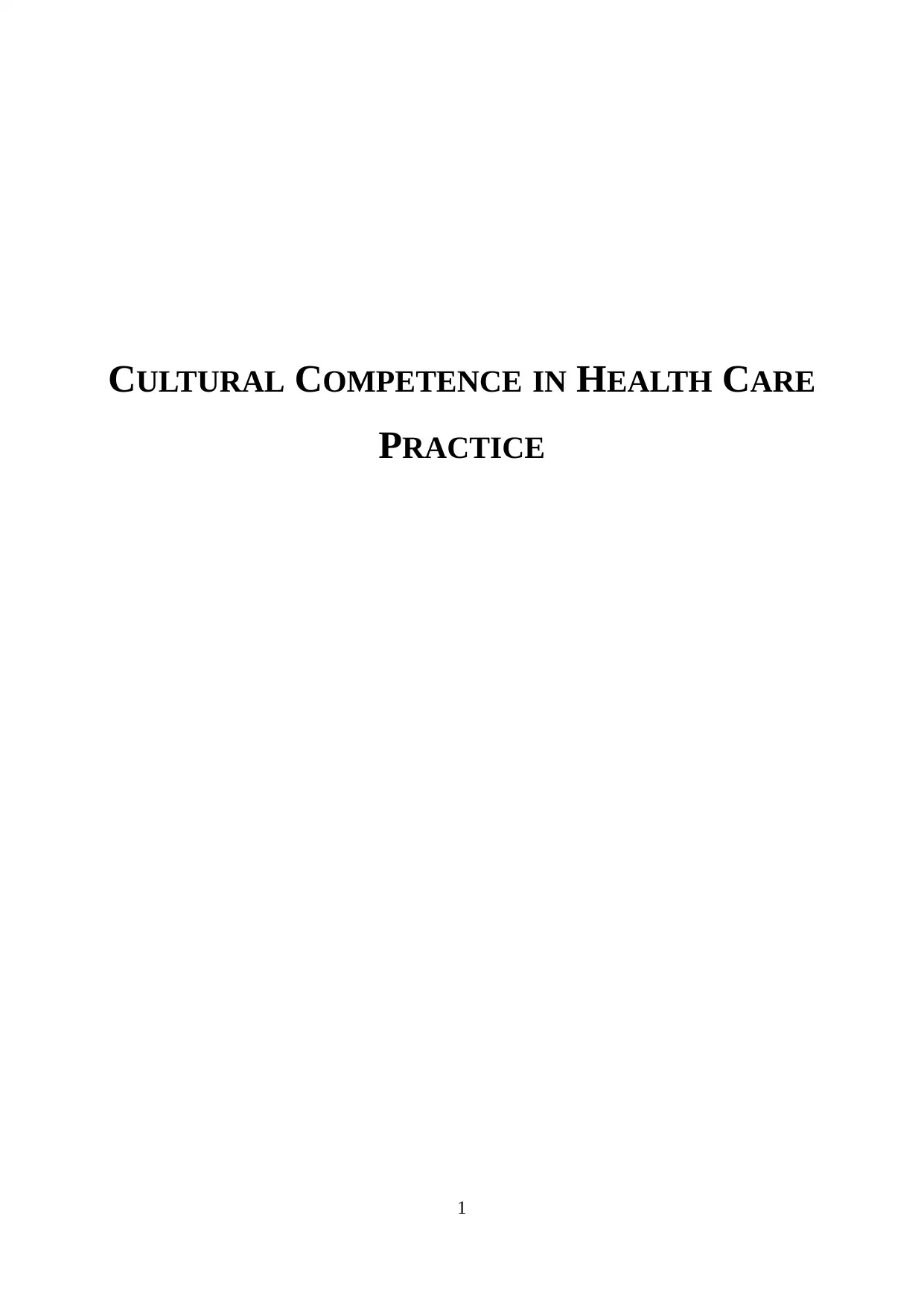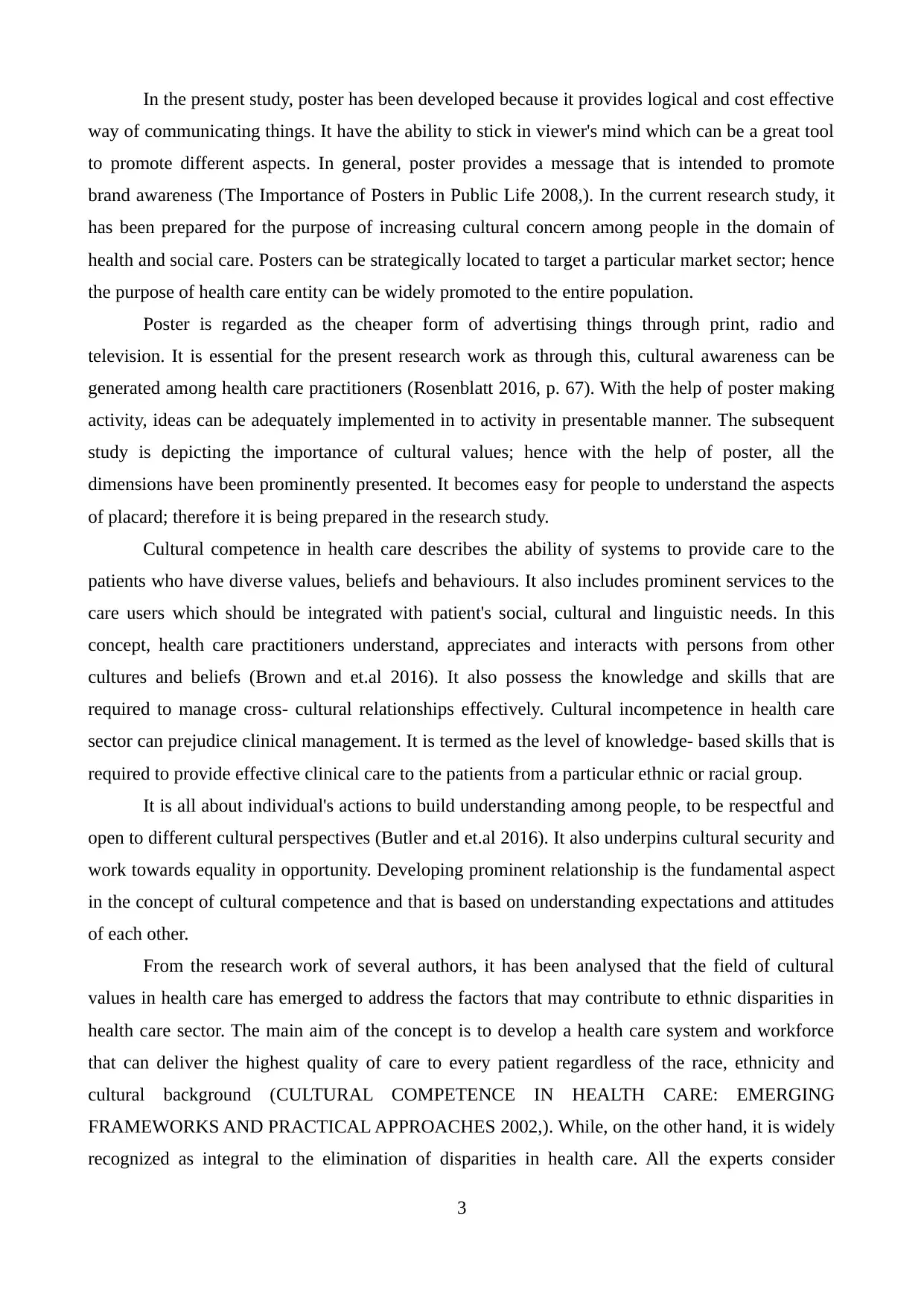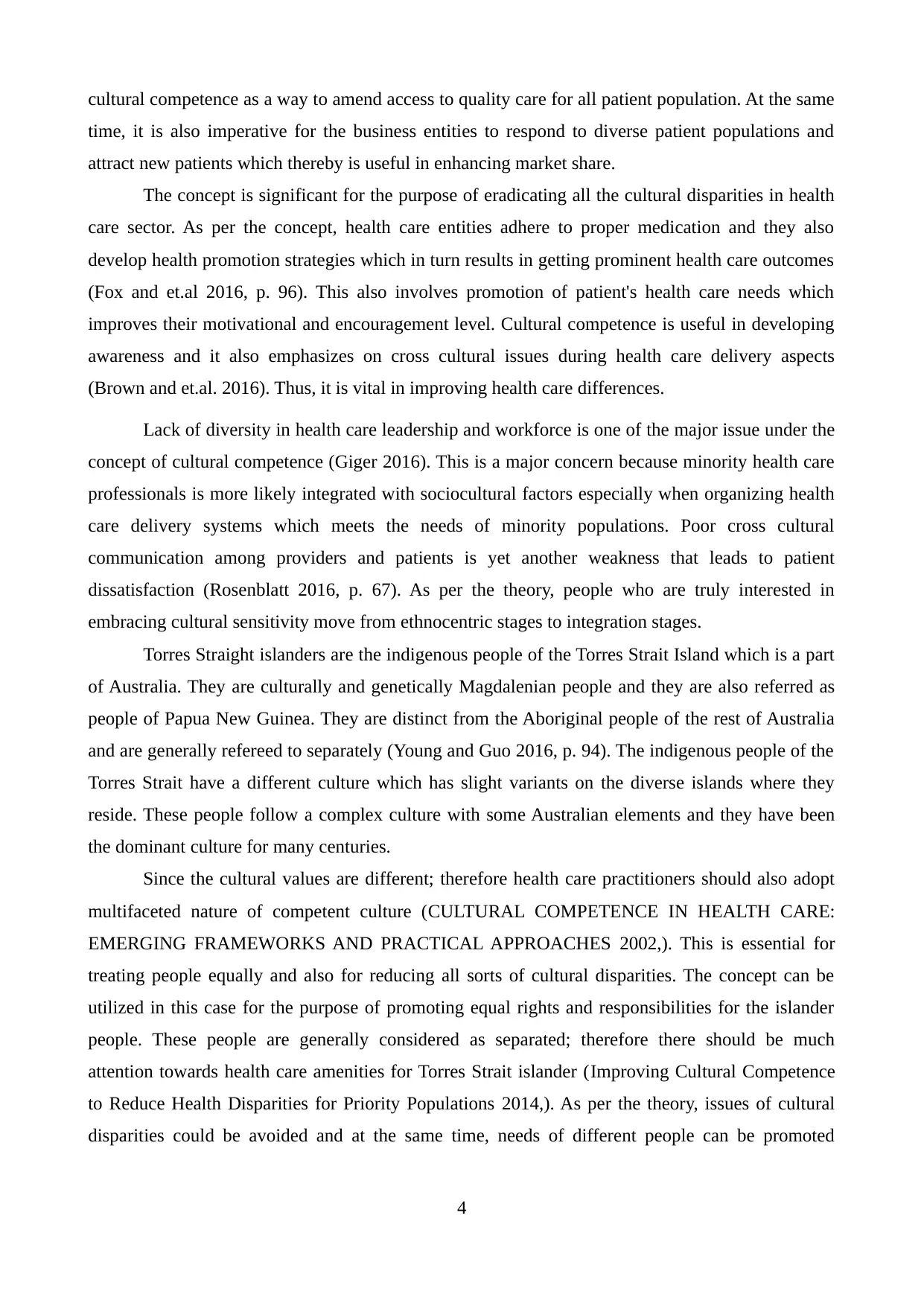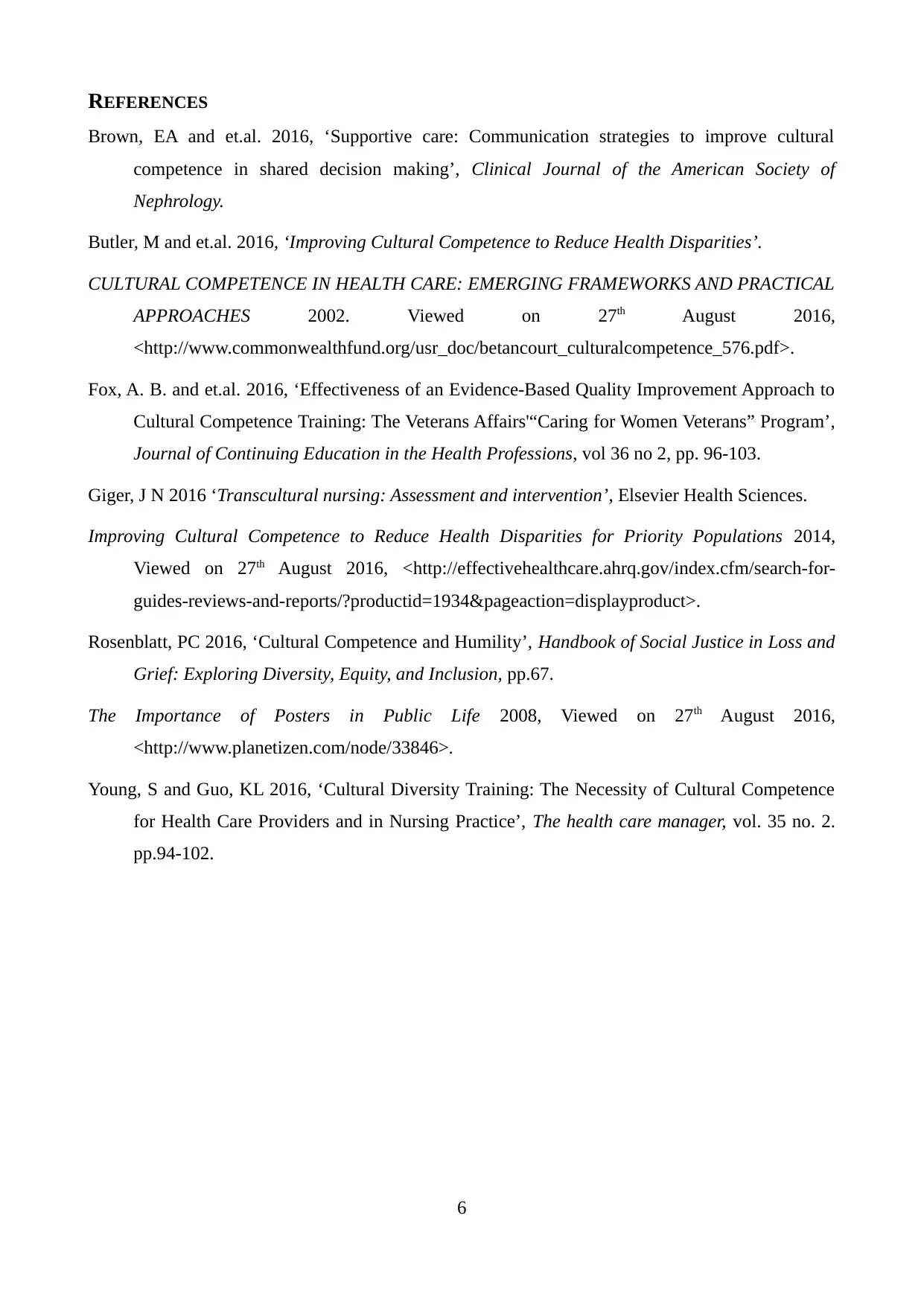Cultural Competence in Healthcare
VerifiedAdded on 2020/01/07
|6
|1378
|256
Report
AI Summary
This report examines cultural competence in healthcare, focusing on the importance of understanding diverse values, beliefs, and behaviors in providing effective patient care. It highlights the need for cultural competence to address ethnic disparities in healthcare and improve health outcomes. The report uses a poster as a communication tool to promote cultural awareness among healthcare practitioners. It discusses the challenges of cultural incompetence, such as poor cross-cultural communication and lack of diversity in healthcare leadership. The report also specifically addresses the unique cultural needs of Torres Strait Islanders in Australia, emphasizing the need for culturally sensitive healthcare practices to reduce health disparities among this population. The report concludes by emphasizing the significance of cultural competence in achieving health equity and improving the quality of care for all patients, regardless of their background.

CULTURAL COMPETENCE IN HEALTH CARE
PRACTICE
1
PRACTICE
1
Paraphrase This Document
Need a fresh take? Get an instant paraphrase of this document with our AI Paraphraser

TABLE OF CONTENTS
References............................................................................................................................................6
2
References............................................................................................................................................6
2

In the present study, poster has been developed because it provides logical and cost effective
way of communicating things. It have the ability to stick in viewer's mind which can be a great tool
to promote different aspects. In general, poster provides a message that is intended to promote
brand awareness (The Importance of Posters in Public Life 2008,). In the current research study, it
has been prepared for the purpose of increasing cultural concern among people in the domain of
health and social care. Posters can be strategically located to target a particular market sector; hence
the purpose of health care entity can be widely promoted to the entire population.
Poster is regarded as the cheaper form of advertising things through print, radio and
television. It is essential for the present research work as through this, cultural awareness can be
generated among health care practitioners (Rosenblatt 2016, p. 67). With the help of poster making
activity, ideas can be adequately implemented in to activity in presentable manner. The subsequent
study is depicting the importance of cultural values; hence with the help of poster, all the
dimensions have been prominently presented. It becomes easy for people to understand the aspects
of placard; therefore it is being prepared in the research study.
Cultural competence in health care describes the ability of systems to provide care to the
patients who have diverse values, beliefs and behaviours. It also includes prominent services to the
care users which should be integrated with patient's social, cultural and linguistic needs. In this
concept, health care practitioners understand, appreciates and interacts with persons from other
cultures and beliefs (Brown and et.al 2016). It also possess the knowledge and skills that are
required to manage cross- cultural relationships effectively. Cultural incompetence in health care
sector can prejudice clinical management. It is termed as the level of knowledge- based skills that is
required to provide effective clinical care to the patients from a particular ethnic or racial group.
It is all about individual's actions to build understanding among people, to be respectful and
open to different cultural perspectives (Butler and et.al 2016). It also underpins cultural security and
work towards equality in opportunity. Developing prominent relationship is the fundamental aspect
in the concept of cultural competence and that is based on understanding expectations and attitudes
of each other.
From the research work of several authors, it has been analysed that the field of cultural
values in health care has emerged to address the factors that may contribute to ethnic disparities in
health care sector. The main aim of the concept is to develop a health care system and workforce
that can deliver the highest quality of care to every patient regardless of the race, ethnicity and
cultural background (CULTURAL COMPETENCE IN HEALTH CARE: EMERGING
FRAMEWORKS AND PRACTICAL APPROACHES 2002,). While, on the other hand, it is widely
recognized as integral to the elimination of disparities in health care. All the experts consider
3
way of communicating things. It have the ability to stick in viewer's mind which can be a great tool
to promote different aspects. In general, poster provides a message that is intended to promote
brand awareness (The Importance of Posters in Public Life 2008,). In the current research study, it
has been prepared for the purpose of increasing cultural concern among people in the domain of
health and social care. Posters can be strategically located to target a particular market sector; hence
the purpose of health care entity can be widely promoted to the entire population.
Poster is regarded as the cheaper form of advertising things through print, radio and
television. It is essential for the present research work as through this, cultural awareness can be
generated among health care practitioners (Rosenblatt 2016, p. 67). With the help of poster making
activity, ideas can be adequately implemented in to activity in presentable manner. The subsequent
study is depicting the importance of cultural values; hence with the help of poster, all the
dimensions have been prominently presented. It becomes easy for people to understand the aspects
of placard; therefore it is being prepared in the research study.
Cultural competence in health care describes the ability of systems to provide care to the
patients who have diverse values, beliefs and behaviours. It also includes prominent services to the
care users which should be integrated with patient's social, cultural and linguistic needs. In this
concept, health care practitioners understand, appreciates and interacts with persons from other
cultures and beliefs (Brown and et.al 2016). It also possess the knowledge and skills that are
required to manage cross- cultural relationships effectively. Cultural incompetence in health care
sector can prejudice clinical management. It is termed as the level of knowledge- based skills that is
required to provide effective clinical care to the patients from a particular ethnic or racial group.
It is all about individual's actions to build understanding among people, to be respectful and
open to different cultural perspectives (Butler and et.al 2016). It also underpins cultural security and
work towards equality in opportunity. Developing prominent relationship is the fundamental aspect
in the concept of cultural competence and that is based on understanding expectations and attitudes
of each other.
From the research work of several authors, it has been analysed that the field of cultural
values in health care has emerged to address the factors that may contribute to ethnic disparities in
health care sector. The main aim of the concept is to develop a health care system and workforce
that can deliver the highest quality of care to every patient regardless of the race, ethnicity and
cultural background (CULTURAL COMPETENCE IN HEALTH CARE: EMERGING
FRAMEWORKS AND PRACTICAL APPROACHES 2002,). While, on the other hand, it is widely
recognized as integral to the elimination of disparities in health care. All the experts consider
3
⊘ This is a preview!⊘
Do you want full access?
Subscribe today to unlock all pages.

Trusted by 1+ million students worldwide

cultural competence as a way to amend access to quality care for all patient population. At the same
time, it is also imperative for the business entities to respond to diverse patient populations and
attract new patients which thereby is useful in enhancing market share.
The concept is significant for the purpose of eradicating all the cultural disparities in health
care sector. As per the concept, health care entities adhere to proper medication and they also
develop health promotion strategies which in turn results in getting prominent health care outcomes
(Fox and et.al 2016, p. 96). This also involves promotion of patient's health care needs which
improves their motivational and encouragement level. Cultural competence is useful in developing
awareness and it also emphasizes on cross cultural issues during health care delivery aspects
(Brown and et.al. 2016). Thus, it is vital in improving health care differences.
Lack of diversity in health care leadership and workforce is one of the major issue under the
concept of cultural competence (Giger 2016). This is a major concern because minority health care
professionals is more likely integrated with sociocultural factors especially when organizing health
care delivery systems which meets the needs of minority populations. Poor cross cultural
communication among providers and patients is yet another weakness that leads to patient
dissatisfaction (Rosenblatt 2016, p. 67). As per the theory, people who are truly interested in
embracing cultural sensitivity move from ethnocentric stages to integration stages.
Torres Straight islanders are the indigenous people of the Torres Strait Island which is a part
of Australia. They are culturally and genetically Magdalenian people and they are also referred as
people of Papua New Guinea. They are distinct from the Aboriginal people of the rest of Australia
and are generally refereed to separately (Young and Guo 2016, p. 94). The indigenous people of the
Torres Strait have a different culture which has slight variants on the diverse islands where they
reside. These people follow a complex culture with some Australian elements and they have been
the dominant culture for many centuries.
Since the cultural values are different; therefore health care practitioners should also adopt
multifaceted nature of competent culture (CULTURAL COMPETENCE IN HEALTH CARE:
EMERGING FRAMEWORKS AND PRACTICAL APPROACHES 2002,). This is essential for
treating people equally and also for reducing all sorts of cultural disparities. The concept can be
utilized in this case for the purpose of promoting equal rights and responsibilities for the islander
people. These people are generally considered as separated; therefore there should be much
attention towards health care amenities for Torres Strait islander (Improving Cultural Competence
to Reduce Health Disparities for Priority Populations 2014,). As per the theory, issues of cultural
disparities could be avoided and at the same time, needs of different people can be promoted
4
time, it is also imperative for the business entities to respond to diverse patient populations and
attract new patients which thereby is useful in enhancing market share.
The concept is significant for the purpose of eradicating all the cultural disparities in health
care sector. As per the concept, health care entities adhere to proper medication and they also
develop health promotion strategies which in turn results in getting prominent health care outcomes
(Fox and et.al 2016, p. 96). This also involves promotion of patient's health care needs which
improves their motivational and encouragement level. Cultural competence is useful in developing
awareness and it also emphasizes on cross cultural issues during health care delivery aspects
(Brown and et.al. 2016). Thus, it is vital in improving health care differences.
Lack of diversity in health care leadership and workforce is one of the major issue under the
concept of cultural competence (Giger 2016). This is a major concern because minority health care
professionals is more likely integrated with sociocultural factors especially when organizing health
care delivery systems which meets the needs of minority populations. Poor cross cultural
communication among providers and patients is yet another weakness that leads to patient
dissatisfaction (Rosenblatt 2016, p. 67). As per the theory, people who are truly interested in
embracing cultural sensitivity move from ethnocentric stages to integration stages.
Torres Straight islanders are the indigenous people of the Torres Strait Island which is a part
of Australia. They are culturally and genetically Magdalenian people and they are also referred as
people of Papua New Guinea. They are distinct from the Aboriginal people of the rest of Australia
and are generally refereed to separately (Young and Guo 2016, p. 94). The indigenous people of the
Torres Strait have a different culture which has slight variants on the diverse islands where they
reside. These people follow a complex culture with some Australian elements and they have been
the dominant culture for many centuries.
Since the cultural values are different; therefore health care practitioners should also adopt
multifaceted nature of competent culture (CULTURAL COMPETENCE IN HEALTH CARE:
EMERGING FRAMEWORKS AND PRACTICAL APPROACHES 2002,). This is essential for
treating people equally and also for reducing all sorts of cultural disparities. The concept can be
utilized in this case for the purpose of promoting equal rights and responsibilities for the islander
people. These people are generally considered as separated; therefore there should be much
attention towards health care amenities for Torres Strait islander (Improving Cultural Competence
to Reduce Health Disparities for Priority Populations 2014,). As per the theory, issues of cultural
disparities could be avoided and at the same time, needs of different people can be promoted
4
Paraphrase This Document
Need a fresh take? Get an instant paraphrase of this document with our AI Paraphraser

properly according to social beliefs. Hence, the concept would be beneficial for Torres islander
people in many ways such as it can eliminate ethnic differences and many more.
5
people in many ways such as it can eliminate ethnic differences and many more.
5

REFERENCES
Brown, EA and et.al. 2016, ‘Supportive care: Communication strategies to improve cultural
competence in shared decision making’, Clinical Journal of the American Society of
Nephrology.
Butler, M and et.al. 2016, ‘Improving Cultural Competence to Reduce Health Disparities’.
CULTURAL COMPETENCE IN HEALTH CARE: EMERGING FRAMEWORKS AND PRACTICAL
APPROACHES 2002. Viewed on 27th August 2016,
<http://www.commonwealthfund.org/usr_doc/betancourt_culturalcompetence_576.pdf>.
Fox, A. B. and et.al. 2016, ‘Effectiveness of an Evidence-Based Quality Improvement Approach to
Cultural Competence Training: The Veterans Affairs'“Caring for Women Veterans” Program’,
Journal of Continuing Education in the Health Professions, vol 36 no 2, pp. 96-103.
Giger, J N 2016 ‘Transcultural nursing: Assessment and intervention’, Elsevier Health Sciences.
Improving Cultural Competence to Reduce Health Disparities for Priority Populations 2014,
Viewed on 27th August 2016, <http://effectivehealthcare.ahrq.gov/index.cfm/search-for-
guides-reviews-and-reports/?productid=1934&pageaction=displayproduct>.
Rosenblatt, PC 2016, ‘Cultural Competence and Humility’, Handbook of Social Justice in Loss and
Grief: Exploring Diversity, Equity, and Inclusion, pp.67.
The Importance of Posters in Public Life 2008, Viewed on 27th August 2016,
<http://www.planetizen.com/node/33846>.
Young, S and Guo, KL 2016, ‘Cultural Diversity Training: The Necessity of Cultural Competence
for Health Care Providers and in Nursing Practice’, The health care manager, vol. 35 no. 2.
pp.94-102.
6
Brown, EA and et.al. 2016, ‘Supportive care: Communication strategies to improve cultural
competence in shared decision making’, Clinical Journal of the American Society of
Nephrology.
Butler, M and et.al. 2016, ‘Improving Cultural Competence to Reduce Health Disparities’.
CULTURAL COMPETENCE IN HEALTH CARE: EMERGING FRAMEWORKS AND PRACTICAL
APPROACHES 2002. Viewed on 27th August 2016,
<http://www.commonwealthfund.org/usr_doc/betancourt_culturalcompetence_576.pdf>.
Fox, A. B. and et.al. 2016, ‘Effectiveness of an Evidence-Based Quality Improvement Approach to
Cultural Competence Training: The Veterans Affairs'“Caring for Women Veterans” Program’,
Journal of Continuing Education in the Health Professions, vol 36 no 2, pp. 96-103.
Giger, J N 2016 ‘Transcultural nursing: Assessment and intervention’, Elsevier Health Sciences.
Improving Cultural Competence to Reduce Health Disparities for Priority Populations 2014,
Viewed on 27th August 2016, <http://effectivehealthcare.ahrq.gov/index.cfm/search-for-
guides-reviews-and-reports/?productid=1934&pageaction=displayproduct>.
Rosenblatt, PC 2016, ‘Cultural Competence and Humility’, Handbook of Social Justice in Loss and
Grief: Exploring Diversity, Equity, and Inclusion, pp.67.
The Importance of Posters in Public Life 2008, Viewed on 27th August 2016,
<http://www.planetizen.com/node/33846>.
Young, S and Guo, KL 2016, ‘Cultural Diversity Training: The Necessity of Cultural Competence
for Health Care Providers and in Nursing Practice’, The health care manager, vol. 35 no. 2.
pp.94-102.
6
⊘ This is a preview!⊘
Do you want full access?
Subscribe today to unlock all pages.

Trusted by 1+ million students worldwide
1 out of 6
Related Documents
Your All-in-One AI-Powered Toolkit for Academic Success.
+13062052269
info@desklib.com
Available 24*7 on WhatsApp / Email
![[object Object]](/_next/static/media/star-bottom.7253800d.svg)
Unlock your academic potential
Copyright © 2020–2026 A2Z Services. All Rights Reserved. Developed and managed by ZUCOL.





